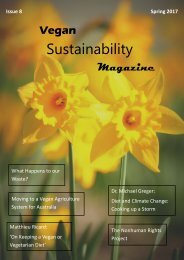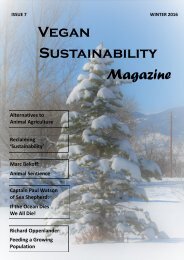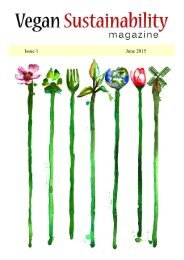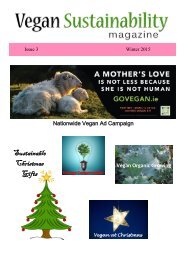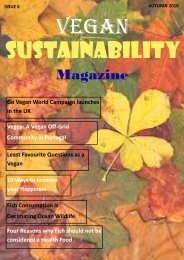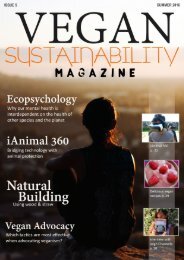Vegan Sustainability Magazine - Autumn 2015
A free, online, quarterly magazine for vegans and non-vegans worldwide who are interested in the environment and sustainability.
A free, online, quarterly magazine for vegans and non-vegans worldwide who are interested in the environment and sustainability.
Create successful ePaper yourself
Turn your PDF publications into a flip-book with our unique Google optimized e-Paper software.
The Commons<br />
Bronwyn Slater gives an introduction to The<br />
Commons - the cultural and natural resources<br />
held in common by all members of a society,<br />
or any system of free and open collaboration,<br />
stewardship and exchange.<br />
I had my first introduction to ‘The Commons’<br />
last September when I attended the ‘Open Everything’<br />
conference at Cloughjordan Eco-Village in<br />
County Tipperary. I was very impressed by one<br />
of the speakers there, Michel Bauwens of the P2P<br />
Foundation. Throughout the weekend I was<br />
brought up to speed on the jargon and terminology<br />
relating to this area.<br />
What do we mean by ‘The Commons’? In<br />
bygone days it referred to the natural resources<br />
such as land and water which people (ie.<br />
‘commoners’) held and used collectively. Nowadays,<br />
the commons refers to more than just nature<br />
– it includes things like free software, free music,<br />
literature and art, free knowledge and information,<br />
and communal finance. It also refers to communities<br />
and groups when they come together voluntarily<br />
to work on a project – whether for social,<br />
environmental, creative or any other reasons.<br />
Generally, the idea can be summarised in two<br />
statements. Firstly, that the planet and its natural<br />
resources are owned by everyone and we are all<br />
responsible for its stewardship. Secondly, that we<br />
can come together as a community or group whenever<br />
we want to carry out a project – be it in the<br />
area of social life, food production, the arts, technology,<br />
or any other field.<br />
Here are some of the broad categories into<br />
which commons activities are usually divided:<br />
The Digital Commons:<br />
This includes Open Source software and hardware.<br />
‘Open Source’ means that the software or<br />
hardware was developed voluntarily by individuals<br />
or groups with the intention that it would be<br />
used freely and without the need for payment.<br />
Examples include Wikipedia (the free encyclopedia)<br />
and Linux (a computer operating system for<br />
pc’s).<br />
The Financial Commons:<br />
This includes alternative and communal finance<br />
such as Crowdfunding, Kickstarter, the<br />
‘Let’s Trade’ movement and local or alternative<br />
currencies.<br />
The Environmental Commons:<br />
The environmental commons includes land,<br />
forests, vegetation, natural resources, water,<br />
oceans and air. For example, land can be shared<br />
via community land trusts and land co-operatives.<br />
The Knowledge Commons:<br />
This includes free education (such as courses<br />
which are available free over the internet),<br />
Wikipedia (the free encyclopedia), public libraries,<br />
and any information or data that is made publicly<br />
and freely available.<br />
A main principle of the knowledge commons<br />
is that traditional ‘copyright’ is replaced by<br />
‘copyleft’. No permission is required and no license<br />
has to be acquired in order to use a work<br />
under copyleft.<br />
The Creative Commons:<br />
This includes art, music, literature, any creative<br />
works and inventions which are made freely<br />
32



